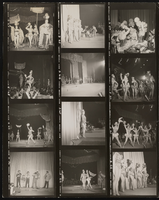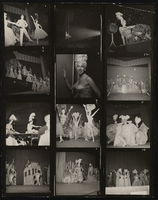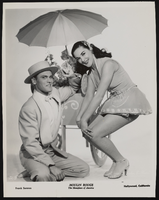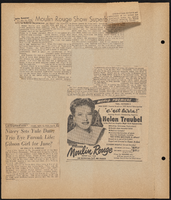Search the Special Collections and Archives Portal
Search Results

Photographs of Donn Arden's production "Voici! Paris" proof sheet, Hollywood (Calif.), 1953-1954
Date
Archival Collection
Description
Image

Proof sheet of Donn Arden's show, Hollywood (Calif.), 1950s
Date
Archival Collection
Description
Image

Transcript of interview with Anna Bailey by Claytee D. White, March 3, 1997
Date
Archival Collection
Description
Interview with Anna Bailey conducted by Claytee D. White on March 3, 1997. Arriving in Las Vegas in 1955 to perform as a dancer for the opening of the Moulin Rouge, Bailey also starred in traveling shows nationally and in Europe. Returning to Las Vegas, she became the first African American to dance in a house chorus line on the Strip. Later she became one of the first black women in Nevada to hold a gaming license, owning and operating several small nightclubs.
Text
Kenny Bayless oral history interview
Identifier
Abstract
Oral history interview with Kenny Bayless conducted by Eric Billington on November 20, 2014 for the African Americans in Las Vegas: a Collaborative Oral History Project. Bayless begins the interview by talking about his childhood in California and his religious upbringing. He then discusses moving to Las Vegas, Nevada in 1972 in order to pursue a career in teaching and coaching track. Bayless discusses his views of Las Vegas upon his arrival, namely the perceptions towards black people in the area. He then details his life as a teacher for the Clark County School District (CCSD), and teaching at the juvenile detention center after his retirement from CCSD. Bayless also discusses the night life in Las Vegas from the 1970s to the present, he talks about the exclusion of black people from certain establishments and the Moulin Rouge Hotel as a respite for black night life in West Las Vegas.
Archival Collection

Photograph of promotion for Donn Arden's show "Voici! Paris," Hollywood (Calif.), 1953-1954
Date
Archival Collection
Description
Image
Louis Family oral history interviews
Identifier
Abstract
Oral history interviews with the family of Joe Louis conducted by Claytee D. White on November 18, 2014 and February 06, 2015 for the African Americans in Las Vegas: a Collaborative Oral History Project. In these interviews, the family of Joe Louis discuss his life and career as a famous African American boxer from the 1930s to 1950s. They describe charity fights he held to raise money for the Navy Relief Fund during World War II, which later became an issue for him when the Internal Revenue Service claimed he still owed taxes on the money he raised despite it being donated. The family discusses what it was like growing up and meeting celebrity friends of Louis', such as Frank Sinatra and Muhammad Ali, Louis' involvement with the Moulin Rouge Hotel-Casino in Las Vegas, Nevada, and Louis' status as an African American sports hero. They also detail his eventual retirement from boxing, his job working as a greeter at Caesars Palace, and his death.
Archival Collection
Willard Booth oral history interview
Identifier
Abstract
Oral history interview with Willard Booth conducted by Larmaya Kilgore on November 14, 2014 for the African Americans in Las Vegas: a Collaborative Oral History Project. In this interview, Booth discusses his personal history and moving to Las Vegas, Nevada in 1956. He describes his employment at the Sands Hotel and Casino and later at the Thunderbird Hotel and Casino. Booth then talks about segregation issues for African Americans working on the Las Vegas Strip. Later, Booth discusses his involvement with the Second Baptist Church and describes the work he would do for the church. Lastly, Booth describes West Las Vegas and entertainers who would perform at the Carver House, the Moulin Rouge, and the Town Tavern.
Archival Collection
Audio clip from interview with Herb Tobman by Deborah Fischer, March 13, 1981
Date
Archival Collection
Description
Part of an interview with Herb Tobman on March 13, 1981. In this clip, Tobman discusses moving to Las Vegas, employment, and the gambling industry.
Sound
Elizebeth Dewey Russell oral history interview
Identifier
Abstract
Oral history interview with Elizebeth Dewey Russell conducted by Claytee D. White on March 23, 2024 for the African Americans in Las Vegas: a Collaborative Oral History Project. In this interview, Russell talks about her mother, Ruth Bradshaw Dewey, a white woman, who taught at the Westside School (1949-1955), saw Josephine Baker at the El Rancho in 1952, attended the opening night of the Moulin Rouge in 1955, and served as the secretary of the Las Vegas branch of the NAACP for several years. Russell describes living with her mother in the Mayfair deveopment just south of 17th Street at Charleston and graduating from Las Vegas High School. She recalls spending summers with her father, John Bradshaw, in Caliente, Nevada, where he worked as a mechanic for the Union Pacific Railroad.
Archival Collection

